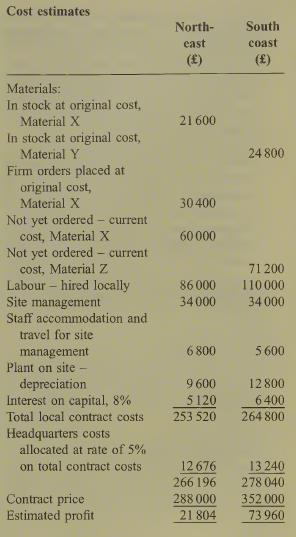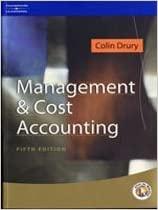Intermediate: Decision on which of two mutually exclusive contracts to accept A company in the civil engineering
Question:
Intermediate: Decision on which of two mutually exclusive contracts to accept A company in the civil engineering industry with headquarters located 22 miles from London under¬ takes contracts anywhere in the United Kingdom.
The company has had its tender for a job in north-east England accepted at £288 000 and work is due to begin in March. However, the company has also been asked to undertake a contract on the south coast of England. The price offered for this contract is £352 000. Both of the contracts cannot be taken simultaneously because of constraints on staff site management personnel and on plant available. An escape clause enables the company to withdraw from the contract in the north-east, provided notice is given before the end of Novem¬ ber and an agreed penalty of £28 000 is paid.
The following estimates have been submitted by the company’s quantity surveyor:
1. X, Y and Z are three building materials. Mat¬ erial X is not in common use and would not realize much money if re-sold; however, it could be used on other contracts but only as a substi¬ tute for another material currently quoted at 10% less than the original cost of X. The price of Y, a material in common use, has doubled since it was purchased; its net realizable value if re-sold would be its new price less 15% to cover disposal costs. Alternatively it could be kept for use on other contracts in the following financial year.
2. With the construction industry not yet recovered from the recent recession, the company is confi¬ dent that manual labour, both skilled and unskilled, could be hired locally on a subcon¬ tracting basis to meet the needs of each of the contracts.
3. The plant which would be needed for the south coast contract has been owned for some years and £12 800 is the year’s depreciation on a straight-line basis. If the north-east contract is undertaken, less plant will be required but the surplus plant will be hired out for the period of the contract at a rental of £6000.
4. It is the company’s policy to charge all contracts with notional interest at 8% on estimated work¬ ing capital involved in contracts. Progress payments would be receivable from the contrac- tee.
5. Salaries and general costs of operating the small headquarters amount to about £108 000 each year. There are usually ten contracts being supervised at the same time.
6. Each of the two contracts is expected to last from March to February which, coincidentally, is the company’s financial year.
7. Site management is treated as a fixed cost.
You are required, as the management accountant to the company,
(a) to present comparative statements to show the net benefit to the company of under¬ taking the more advantageous of the two contracts;
12 marks)
(b) to explain the reasoning behind the inclusion in (or omission from) your comparative finan¬ cial statements, of each item given in the cost estimates and the notes relating thereto.
Step by Step Answer:






